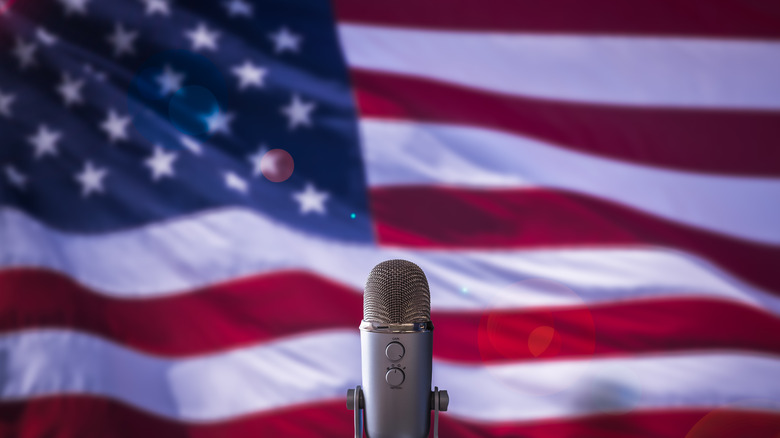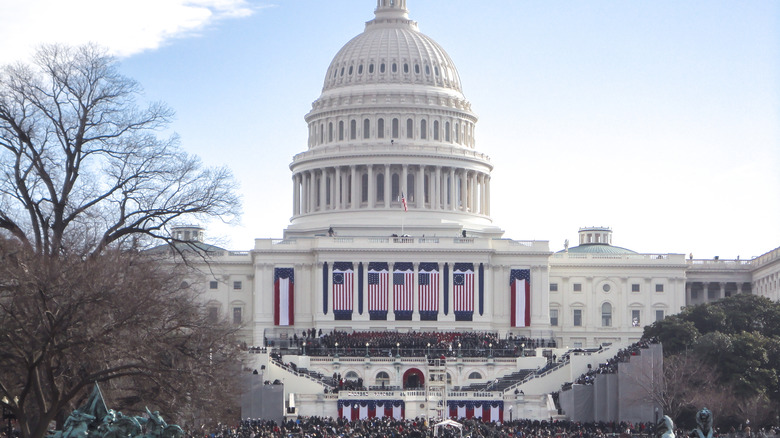Has Anyone With A Criminal Record Ever Been Elected President Of The US?
Folks alive during the Clinton administration might remember how unusual, and almost endearing, it was to see President Clinton pushing open the doors of McDonald's toting a paper bag with a Big Mac inside. "Here," people thought, "is an everyman president who understands the plight of the common person." Well, at least some people thought so. The former "fat band boy," as Clinton was once called (via The U.S. Sun), then went on to do something that plenty of other people do: have an affair. He also got down with the chronic in his youth, but "didn't inhale." And did we mention that he was impeached for lying under oath regarding the affair? Impeachment is not the same as being accused of a crime, though. Clinton, as History explains, was acquitted rather than convicted.
In the end, some folks find it comforting that presidents are regular folks. Others prefer a more classical version of leadership, where the one in charge represents the best of us — the most unimpeachable, you might say. Some might be fine with a leader who gets down in the club, like Finnish Prime Minister Sanna Marin, who was caught on video rub-a-dubbing during COVID-19 (per BBC). But how about an actual criminal record? Would U.S. voters, let's say, be ok with a president who was a convicted criminal? Does it depend on the type of crime? Is it even possible for a convicted criminal to be president? The answer to the last question is: "yes."
Only three requirements for the presidency
Folks who grew up in the U.S. all (hopefully) remember the basics of government from grade school: three branches of power (executive, legislative, judicial), a system of checks and balances to restrain abuses of power, etc. So how about the presidency? Exactly how stringent are the requirements for holding the highest office in the land?
As it turns out, it just might be easier to apply for the presidency (that's basically what an election is) than it is to apply for a job at McDonald's. As the White House's website says, there are only three legal qualifications necessary to run for president. These qualifications are laid out in the U.S. Constitution. The president must be a natural born citizen (not born in another country), have lived in the United States for at least 14 years (no lifelong expats allowed), and be at least 35 years old.
So does it matter if the applicant has a criminal record? Nope. Does it matter if they dealt dope and went to jail for 30 years? Nope. Does it even matter if they ran over like 20 people while drunk driving? Also nope. Legally and officially, these things are all ok. In reality, despite slipping standards of presidential conduct, the public still has standards (we assume). It doesn't seem likely that a mass manslaughterer or dope dealer would be elected over someone who's squeaky clean.
Former criminal candidates
Looking back to history, there have been three convicted criminals who've run for president. This isn't a lot at all, especially since 1,214 people ran for president in 2020 besides the two main candidates, per the BBC. Why didn't you hear about them? It takes lots of ad-bucks to let folks know about your presidential bid, and big news outlets aren't going to talk about people who aren't serious contenders, or who don't spend big on advertising.
So how about those three criminal candidates? In 1920, as Recording Law says, Socialist Party Leader Eugene V. Debs ran for president from jail. His crime? He'd advocated dodging the draft. In the end, he earned 3.4% of votes. Much later in 1992, Lyndon LaRouche also ran for president from prison. He wound up running a total of nine times, and in 1992 garnered less than 0.1% of total votes. Finally, in 2012 Keith Judd got 41% of the Democratic primary vote in West Virginia vs. incumbent Barack Obama. Judd was also one of those guys who ran for president again and again, like a hobby.
How Stuff Works goes into a bit more detail about this whole issue. Congress could potentially pass a law disqualifying certain people from running for president. However, law professor at the University of Iowa College of Law Derek Muller says that the Supreme Court would probably declare the law unconstitutional. So for better or worse, it seems like practically anyone can continue running for president in the foreseeable future.


